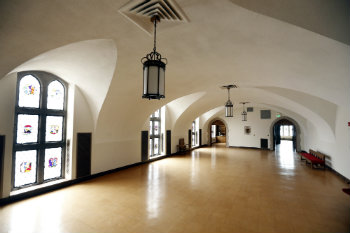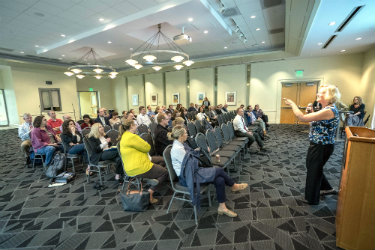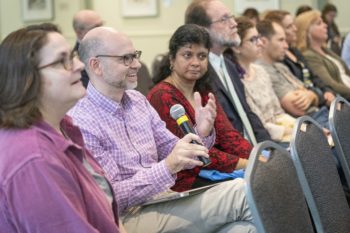Recommendations for 19th Avenue building renovation presented

Many more opportunities for faculty interactions across schools and disciplines—ranging from scholarly collaborations to social gatherings—will be among the benefits of Vanderbilt’s planned renovation of an architecturally noted building at 1101 19th Ave. S.
That was among the findings of a programmatic feasibility study discussed at an April 12 town hall hosted by Provost and Vice Chancellor for Academic Affairs Susan R. Wente in partnership with the Faculty Senate.
The 15,000-square-foot building, which the university purchased in 2015, previously housed archival materials of the Disciples of Christ Historical Society. The group leased back the building from Vanderbilt until the society was able to re-locate all of its materials.
“We have been able to plan thoughtfully and conduct in-depth discussions on a significant renovation to provide welcoming, collaborative working spaces close to campus,” Wente said. “We do want to be sure that the updated space will align with Vanderbilt’s values. This town hall is one of several steps to gather input from the university community on the feasibility study.”
Also speaking at the town hall were Faculty Senate President Vicki Greene, University Architect Keith Loiseau and John TeSelle, a Nashville architect who has been hired as project consultant.
The feasibility study proposes that the 63-year-old building become home to a digital commons, faculty commons, an administrative home for the Faculty Senate and satellite storage space for the Jean and Alexander Heard Libraries.
The digital commons—defined as the home for trans-institutional digital technicians who enable faculty innovation and creativity—will have collaboration and/or dedicated work space for such groups as the Vanderbilt Institute for Digital Learning and the Center for Digital Humanities with hoteling or touch-down space for other units, such as the Center for Teaching and the library’s Digital Scholarship and Scholarly Communications Office.

“The growth and demand for resources related to digital scholarship has accelerated rapidly the past five years, and our digital initiatives are spread all over campus,” Wente said. “Those programs that share interests and goals provide the synthesis for the digital commons.”
The new digital commons is slated to include a green room studio, media classroom and editing room on the garden (basement) level of the building. Meanwhile, a high-tech open lab and seminar room for the Center for Digital Humanities will be situated on the first floor.
The faculty commons will be a welcoming place for supporting faculty development and diversity through trans-institutional initiatives and activities. The space can host faculty development workshops, formal celebrations and casual gatherings.
“The faculty commons will be a dynamic space located in a gem of a building,” Greene said. “Knowing the frequent challenges of finding open rooms on campus for meetings, this is much needed and appreciated by the faculty. When we have visitors, the impression that this building conveys about Vanderbilt will be extremely positive. It’s going to underscore the respect that the university has for the faculty as well as the important work happening with the digital humanities.”
Greene also noted the proximity of the building to the 21st Avenue side of campus and nearby restaurants.
Space on the second floor will be configured as a dedicated office for the Faculty Senate. The Faculty Senate will have access to the large and small meeting rooms for senate and committee meetings.
The building’s core consists of a system of library stacks on all three floors, which can be utilized for extra library storage.
Loiseau noted that flexibility with the usage of space is one of the guiding principles with the design. “We want to create spaces in which uses can change over time without having to do another major building renovation,” he said. “This promises to be a ‘high-performance building’ with design concepts that are in alignment with FutureVU, SkyVU and other major initiatives across campus.”
It was noted that the building requires major upgrades to bring it up to Vanderbilt’s standards in terms of accessibility, including improved entrances and elevators. Work-life balance amenities to be added include a shower on the garden level and a mother’s room. Plans call for the former “Memorial Room” on the first floor to become a lounge and breakroom with self-serve hot and cold beverages and high-end vending options. A full-service catering kitchen will be located adjacent to the large event space on the second floor.
Among questions asked during the town hall was whether groups other than faculty would be able to reserve building’s meeting spaces. Wente responded that a governance committee will be appointed to determine priorities and policies regarding space usage.
“For now, we are focused on the vision, the function and how we’re going to be able to leverage this project for collaboration and community,” she said.
The schematic design phase of the project is just beginning, with an estimated project completion date of August 2020. For more information, email Sally Parker.
